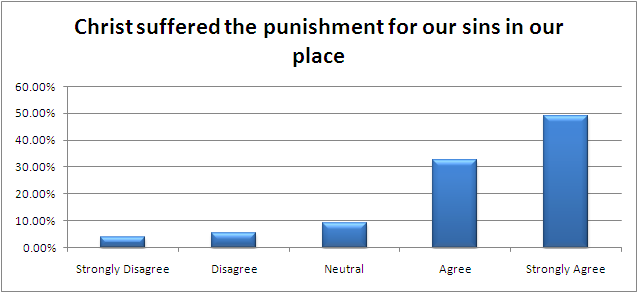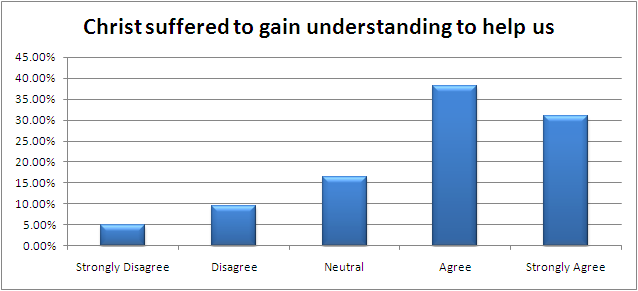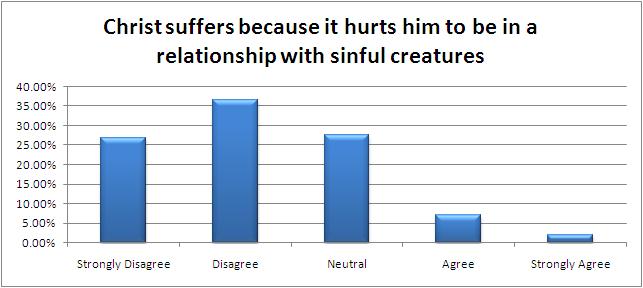Survey Results Part 6- Atonement, the Popular Vote
Continued from here.
For the full series click here.
So I was a little surprised by this set, though in hind sight, it makes perfect sense.
I only asked 3 questions regarding the atonement, so I did not really represent the full swath of opinions, but I thought these three would be a good starting point for the Thang.
First, I tried really hard to capture precisely Penal Substitution Theory:
As can be seen, this one is pretty popular among us with 82% in agreement here.
Secondly, I wanted to try and capture the Alma 7 version of things in a non-scriptural way:
Agreement dropped to 69% here, which, while still high, does show people were less comfortable with this idea over penal-substitution.
Finally, I did my best to capture in one sentence the compassionate theory of the atonement as expressed by Blake Ostler:
Yikes, only 9% agreed.
My take away is that we’ve failed. Only kidding.
But seriously, the penal-substitution theory of atonement is pervasive in the church. Why is that?





I think the tables are wrong. The first is the same as the last and does not describe penal substitution theory. Though I could be wrong.
Comment by Aaron R. — June 11, 2010 @ 7:53 am
Thanks Aaron, Fixed.
Comment by Matt W. — June 11, 2010 @ 7:56 am
‘But seriously, the penal-substitution theory of atonement is pervasive in the church. Why is that?’
This is a very simplistic answer, but I suspect that it is primary due to the fact that this is the view which is taught most often by GC, and to my knowledge always has been.
I am surprised that the Alma 7 version was not as strongly supported as number 1. Perhaps this highlights that if the words used to describe these theories are outside of the normative Mormon discourse people are likely to resist them just because they sound apostate rather than reflecting a specific theological position.
This would be the second reason why your Penal substitution theory was so popular, its discursive frame was well within the mainstream.
Comment by Aaron R. — June 11, 2010 @ 7:59 am
Most depressing post ever. Good points Aaron.
Comment by Jacob J — June 11, 2010 @ 8:01 am
One difficulty is “Christ suffered the punishment for our sins in our place” is ambiguous enough (without further clarification) to work for penal substitution, restitution substitution, and several theories of justification as well.
The I think the problem here is the word “punishment” is often used in a more colloquial sense that encompasses restitution, burden sharing, etc. Substitution in some form is so strongly supported by the Bible that people are going to overlook the ambiguity here.
Properly identifying support for _penal_ substitution probably requires multiple choice questions that give several alternatives and let the person pick the one he/she thinks is the best.
The general agree/disagree thing tends to cause an internal thought process like “what is the position that I am implicitly voting against if I agree with this statement”. If the position the person believes he is voting against is non-substitutionary atonement, he will vote yes despite misgivings about the use of the word “punishment”.
Comment by Mark D. — June 11, 2010 @ 8:26 am
Penal substitution is, from my point of view, the simplest theory to comprehend. It makes very clear what I stand to gain from the atonement. It’s easy to understand = it’s easy to teach = we grow up learning it.
(note: that doesn’t mean that it’s right, just that it’s simple)
Comment by BrianJ — June 11, 2010 @ 9:34 am
BrianJ, I do think that if we practiced more and had a century or two to perfect it, we could get pretty good at teaching something else. I know you not saying it is right, I just think it is only easy because it has become such not because it is inherently easier to teach.
Comment by Aaron R. — June 11, 2010 @ 10:12 am
Atonement, the most talked about (in recent years) and yet least thought about (it seems) idea among Mormons. You really can’t get away with discussing it in a theoretical sense in most church units without raising eyebrows above the hairline. Way to go Matt.
Comment by WVS — June 11, 2010 @ 10:35 am
Jacob: Most depressing post ever.
Hehe. Well it at least supports my theory that God often doesn’t care when we believe false stuff. (See here and here)
Comment by Geoff J — June 11, 2010 @ 11:13 am
Aaron R: I’d like to believe you, but personal experience (teaching my own kids) tells me that penal substitution relies on concepts that they instinctively “get.” It might be easier to teach them the other theories if I could somehow prevent them from ever being exposed to the penal substitution idea—like starting a veggie garden in a weed-free biosphere (make of that analogy what you will!).
Geoff:
Or maybe he’s still trying to figure it out…. ;)
Comment by BrianJ — June 12, 2010 @ 3:44 pm
I sent your poll to my very conservative mother and sister-in-laws and they had a similar reaction to the wording. but once I explained it they were very much in agreement of Jacob’s and Blake’s views on atonement.
Comment by Riley — June 13, 2010 @ 3:01 pm
The thing is though, they don’t even realize there is “other” theories of atonement within mormonism (if notchristianity as a whole). So they were surprised when I explained the different mormon and lassical christian attempts at soteriology. They always just assumed mormonism has it’s one true theory, while all others have some apostate version.
Comment by Riley — June 13, 2010 @ 3:07 pm
They always just assumed mormonism has its one true theory, while all others have some apostate version.
This summarizes of a large percentage of the Sunday School comments I have ever heard.
Comment by Jacob J — June 13, 2010 @ 6:37 pm
I had the missionaries over to dinner last night and gave them my doctrine survey. For this statement in the survey:
Immutable eternal law requires that someone be punished in response to every individual sin.
they both scored this a “4” (highest possible) which in my survey means “If I discovered I was wrong about this being true it would shake the foundations of my testimony in a significant way.”
Afterward, we had a good discussion about justice and the atonement. They were not prepared to think about the atonement on any other terms than the penal-subtitution theory, almost to an alarming extent, but it was an interesting discussion. I gave them a reading assignment of Alma 41-42 and told them we’ll discuss it when they are done.
Comment by Jacob J — June 15, 2010 @ 4:26 pm
You’re going to hell Jacob J…
Comment by Riley — June 15, 2010 @ 4:50 pm
Almost definitely.
Comment by Jacob J — June 15, 2010 @ 10:41 pm
I’d like to see another graph
“In Christ’s death and resuresction he did what no one else could do, he victoriously overcame death”
Comment by Patricia — June 15, 2010 @ 10:50 pm
Patricia, sadly I did not ask that question, but I am fairly confident it would be high in the “Strongly Agree” category.
Comment by Matt W. — June 16, 2010 @ 6:46 am